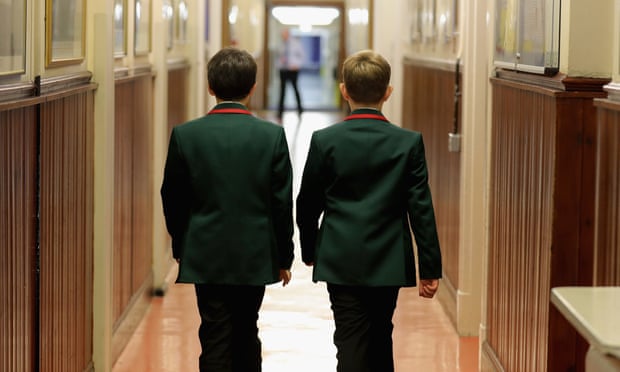
When Angela Rayner set out Labour’s 10-point plan for “cradle to grave” learning last week, it had the air of a grand vision about it. From policies for early intervention services to investment in adult education, this was a pitch rarely heard in modern politics: our schools can genuinely provide an equal chance for every child and there are practical measures we can take to achieve it.
The thing is, the values many of us hold when it comes to deciding life chances couldn’t be further from the way this country actually runs its education system. The fact that, say, poor children’s reading skills are almost three years behindtheir wealthy peers’ contradicts the widely held idea that it should be our talent and hard work that matters. That pupils from private schools are still two and a half times more likely to enter a leading university than state-school teenagers goes against common beliefs on fairness.
Nowadays, it’s widely believed that meritocracy is a myth; that a country in which Boris Johnson is foreign secretary is not one in which the best and brightest have an equal shot but rather, where wealth buys a leg-up. To feel concern about this – to believe there has to be a better way of organising society – goes beyond “leftwing” or niche ideas to the shared values that make up our common understanding of how opportunity and rewards should work.
But what should we actually do about it? In my PhD research on unequal life chances in Britain, I argued that the idea of equal opportunity – that a child’s future should be determined by how hard they work, not how rich their parents are – is in some ways deceptive: in theory, it’s so easy to accept that it’s espoused by politicians of every stripe but in practice, political parties would need to promote vast changes to occur in order to achieve it (or anything close). Rayner’s plan to reverse the Conservatives’ £500m cuts in funding for Sure Start centres is testament to the fact that we know investing in children’s centres and early intervention services is one of the most effective ways to start.
For this to really have impact, however, we have to look beyond how we run our schools. Britain’s education system is routinely kept separate from other government’s departments. But this isn’t how life works: opportunity and academic attainment don’t exist in a vacuum, enclosed within the school gates. A country that’s serious about genuine equal opportunity has to re-evaluate the multiple other areas that breed and foster inequality: everything from housing, healthcare and transport links to wages. Building more social housing is a logical start; low-income families don’t need to lose half their income on private rents and no child has to spend their most precious developmental years in insecure tenancies, uninhabitable housing and temporary accommodation. Social security can actually provide a safety net – not the destitution that current levels often provide – so the children of parents too ill to work, or those relying on in-work benefits, aren’t left hungry. Similarly, we can provide workers with a higher minimum wage and secure contracts (which is also circular: a more educated workforce would help shift to a high-skilled, high-wage economy), as well as increasing funding for adult education so all opportunity isn’t pushed towards teenage years.
We could also start thinking seriously about redistributive measure: from a cap on wages, a high inheritance tax, to a more progressive taxation system. That’s the irony of equal opportunity: by definition, it doesn’t question capitalist unequal rewards – rather, it wants to create an equal opportunity for them – but for it to be possible, we have to tackle the vast inequality in income that means some children’s parents have fortunes to raise them with while others work all day and need food banks to eat. There are, of course, stumbling blocks. It would be easy to dismiss large-scale social change with the usual fear it would be “too expensive”, but this is looking at the problem backwards. Poverty is expensive. Dealing with its effects costs the public purse £78bn a year, or £1,200 for every person in the UK, due to anything from health problems to lost tax revenues. If we want a cost-effective system, we’d invest in structures – housing, schools, health – rather than trying to plaster over problems later.
Similarly, if you’re concerned with finding the “best and brightest”, inequality of opportunity is a grossly inefficient system – wasting the potential of millions of disadvantaged children who could otherwise grow up to be doctors, educators and community leaders.
Other obstacles are less practical. The idea that there are some people naturally born to succeed, while others are inevitably destined to poverty, is still persistent and a powerful mechanism in discouraging steps to level the playing field. It also feeds in to deeply embedded feelings that, no matter how much we may believe in fairness, we still want to give our own family an advantage – whether that’s buying a better education for our children at the expense of others or not voting for, say, more social housing if we don’t need it ourselves. But as a society, it’s surely up to us to decide the balance between that pull and the bid for a fair way to live. We do that already. Even now, the parental urge to do anything for our own children’s life chances does not translate as a moral or legal justification; if it did, it wouldn’t be against the law for a mum to steal a laptop for her son’s English coursework or wrong for a dad to take his daughter’s A-level maths.
These are clearly big questions. What is the best way to organise a society? What should we do to create genuine fairness? We may decide that there are certain routes we don’t want to go down; that some measures aren’t fitting, that others are preferable. But like all attempts to find the best way to live together, the key, I think, is to start questioning – and from there, to decide the changes we need. As things stand, Britain’s children are born with their life chances already rigged. That isn’t something to ignore.
[“Source-theguardian”]









